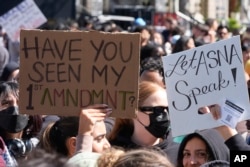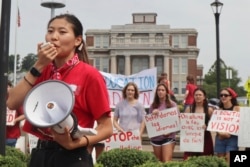Student Union
- By VOA News
15 cheapest US universities for international students
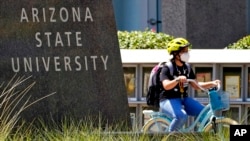
Yahoo!Finance has compiled a list of the 15 cheapest U.S. universities for international students.
Among them: Arizona State University, the University of North Carolina at Chapel Hill and Michigan State University.
Read the list here. (March 2024)
- By VOA News
Studying STEM? International students have funding options

US News & World Report takes a look at funding options for international students pursuing STEM degrees in the U.S.
The article explains the different kinds of scholarships and grants and offers tips on getting part-time jobs and private student loans. Read the full story here. (March 2024)
- By Robin Guess
US campuses are battlegrounds in free speech debate

Editor's note: The 22nd paragraph of this article has been updated to correct the name of an organization.
This week the University of Southern California canceled the graduation speech of its senior class valedictorian at a time when there is a growing debate over the limits of free speech on American college campuses.
USC’s Asna Tabassum, a Muslim biomedical engineer major, was selected from among 100 outstanding students to address the graduating class of 2024 this May. However, the school withdrew the invitation for her to speak at the graduation ceremony citing safety concerns.
Tabassum denounced the decision, which she attributed to her public support for Palestinian human rights. She said it is part of “a campaign of hate meant to silence my voice.”
The school maintains it is a safety issue, not about free speech. School officials say they received an alarming number of violent threats after selecting her as speaker.
USC is one of many American universities that have struggled with policies over free speech and campus protest since October’s Hamas terrorist attack on Israel and the continuing fighting in Gaza. After weeks or months of on-campus protests and rallies, schools have been taking more forceful action to punish protesters who administrators say have become disruptive.
On Thursday at Columbia University in New York, police arrested more than 100 students who had gathered on campus for pro-Palestinian protests. The school’s dean wrote that the protesters had been told several times that they were violating university policies and would be suspended. The students say they were exercising their free speech rights.
At Washington’s American University, protests in all campus buildings have been banned by the school’s president since January. Under the new policy, students may not hold rallies, engage in silent protests or place posters in any campus building.
Protests and safety
University students have a long history of engaging in political activism. From the Vietnam War to abortion rights, universities have played a key role in American political debates.
However, students now say that schools like AU with a long-standing protest culture are silencing protesters with new rules.
Arusa Islam, American University student body president-elect and current vice president, says the policies are preventing an open discussion about U.S. foreign policy.
“Indoor protesting was never a problem, it was never an issue before October 7th,” Islam said. “Students were allowed to put up posters in buildings and students were allowed to have a silent protest.”
“And now we don’t have that right anymore,” she added. “We have been silenced and it is affecting us greatly.”
American University’s president, Sylvia Burwell, says the school’s new policies are intended to ensure that protests do not disrupt university activity.
Burwell also referred to recent events on campus that “made Jewish students feel unsafe and unwelcome.” She added, antisemitism is abhorrent, wrong, and will not be tolerated at American University.
While administrators insist that they are making narrow restrictions in the interests of providing an education, critics say the policies have a far-reaching effect.
At Cornell University, where new rules took effect in January, Claire Ting, the executive vice president of the Cornell Student Assembly, said the policies have had an unsettling effect on campus.
“The campus climate at Cornell has been tense surrounding free speech in recent times,” Ting emailed VOA.
Ting said that both students and faculty feel the policy has had chilling effects on free expression.
“Students report facing arbitrary, escalating punishment for violating the policy, with the policy itself lacking clear outlines for the consequences of civil disobedience,” she added.
In its new policy Cornell warns students that disciplinary action may be taken if protests impede people or traffic, damage school property or interfere with the school’s operations in any way.
In its campus-wide notice explaining the new guidelines, the school wrote that the new policy would ensure that expressive activity is allowed but must remain nonviolent.
The Foundation for Individual Rights and expression, also known as FIRE, has tracked free speech issues on American campuses.
FIRE and College Pulse have produced an annual survey, since 2022, ranking colleges based on their policies and what students say about the free speech climate on campus.
This year the group reported that “alarming” numbers of students say they self-censor or “find their administrations unclear” on free speech issues.
“College campuses have always been places where students have been unafraid to express themselves and with the recent Gaza conflict after the 10/7 attacks, it’s been very heated on both sides of this issue,” said Zach Greenberg, the senior program officer of FIRE.
Harvard ranked last in this year’s survey. FIRE said the school punished some professors and researchers over what they had said or written, and students reported a poor climate for free speech on campus.
The controversy came to Congress late last year, when Harvard’s president testified over complaints of widespread antisemitism.
“I don’t think you’d find many students on campus right now that would say we are the model for flourishing free speech and ideas exchange in the country,” said J. Sellers Hill, president of Harvard’s school newspaper The Harvard Crimson.
“But I think you’ve really seen that be acknowledged by administrators and it seems to be something they are dedicated to taking on.”
As the head of The Harvard Crimson, Hill manages the paper’s 350 editors and 90 reporters, who’ve covered, in detail, the ongoing free speech/protests controversy and the resignation of former President Claudine Gay following her testimony to Congress.
“I think no one would dispute Harvard has work to do and progress to make,” Hill said. “I think it’s a tough sell, for me, that Harvard is uniquely in its own league in terms of intolerance of speech. That doesn’t square with what I have seen on our college campus or on other college campuses around the country. I think Harvard is held to a higher standard.”
Proposed settlement offered over financial aid allegations
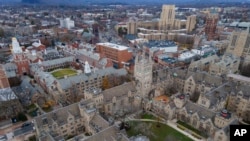
A group of U.S. colleges and universities have agreed to settle a lawsuit alleging deceptive financial aid tactics, according to a report published in The Hill.
The schools would pay $284 million to plaintiffs who were enrolled full-time and received financial aid between 2003 and 2024.
The schools have denied the allegations. (April 2024)
Universities in Middle East building research relationships with China

As China bolsters research relationships with universities in the Middle East, the United States has taken notice – especially when that research involves artificial intelligence.
Reporting for University World News, Yojana Sharma has the story. (March 2024)
Tips for staying safe while studying in the US
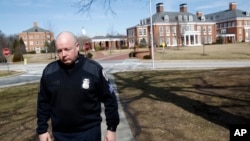
Recent news events have raised safety concerns among some international students studying in the United States.
Adarsh Khandelwal, writing in the India Times, has tips for staying safe from the moment you arrive until the day you complete your studies. (March 2024)
Some colleges are making digital literacy classes mandatory
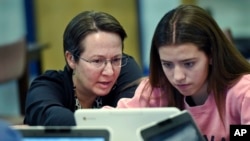
A 2019 study by Stanford found that most college students can’t tell the difference between real and fake news articles. Amid rampant online disinformation, and the threat of AI-generated images, some schools are making students learn “digital literacy” to graduate.
Lauren Coffeey reports for Inside Higher Ed. (March 2024)
With federal student aid delays, students aren’t sure what college will cost
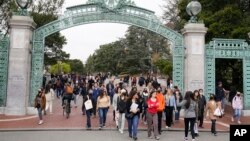
The U.S. Department of Education’s federal student aid form (FAFSA) experienced serious glitches and delays this year.
Now, many students have been admitted to college, but don’t know how much money they’ll need to attend.
Read the story from Susan Svrluga and Danielle Douglas-Gabriel for The Washington Post. (March 2024)
Senator draws attention to universities that haven’t returned remains
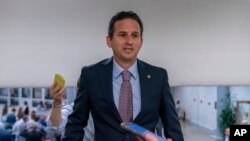
More than 70 U.S. universities continue to hold human remains taken from Native American burial sites, although those remains were supposed to be returned 30 years ago.
Jennifer Bendery writes in Huffington Post that one senator has been using his position in an attempt to shame universities into returning remains and artifacts. (April 2024)
COVID forced one international student to go hungry
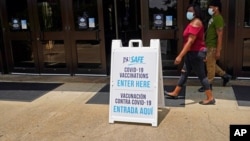
When Samantha (not her real name) enrolled in community college in the U.S., her family at home in South Africa scrimped and saved to support her.
But the COVID-19 pandemic hurt the family’s finances, and at one point Samantha had four on-campus jobs just to make ends meet. Many in the U.S. believe international students are wealthy sources of funding for universities, but stories like Samantha’s suggest otherwise.
Andrea Gutierrez reports for The World. (March 2024)
Tips for paying for a STEM degree as an international student

For US News & World Report, Melanie Lockert describes how to calculate the cost of a STEM degree, and where to find funding. (March 2024)
NAIA all but bans its transgender college athletes from women's sports
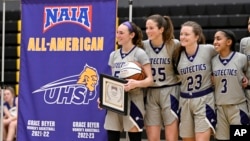
The National Association of Intercollegiate Athletics, the governing body for mostly small colleges, announced a policy Monday that all but bans transgender athletes from competing in women's sports.
The NAIA's Council of Presidents approved the policy in a 20-0 vote. The NAIA, which oversees some 83,000 athletes at schools across the country, is believed to be the first college sports organization to take such a step.
According to the transgender participation policy, all athletes may participate in NAIA-sponsored male sports but only athletes whose biological sex assigned at birth is female and have not begun hormone therapy will be allowed to participate in women's sports.
A student who has begun hormone therapy may participate in activities such as workouts, practices and team activities, but not in interscholastic competition.
"With the exception of competitive cheer and competitive dance, the NAIA created separate categories for male and female participants," the NAIA said. "Each NAIA sport includes some combination of strength, speed and stamina, providing competitive advantages for male student-athletes. As a result, the NAIA policy for transgender student-athletes applies to all sports except for competitive cheer and competitive dance, which are open to all students."
There is no known number of transgender athletes at the high school and college levels, though it is believed to be small. The topic has become a hot-button issue for those for and against transgender athletes competing on girls' and women's sports teams.
At least 24 states have laws barring transgender women and girls from competing in certain women's or girls sports competitions. Last month, more than a dozen current and former college athletes filed a federal lawsuit against the NCAA, accusing the sports governing body for more than 500,000 athletes of violating their rights by allowing transgender women to compete in women's sports.
The Biden administration originally planned to release a new federal Title IX rule — the law forbids discrimination based on sex in education — addressing both campus sexual assault and transgender athletes. But earlier this year, the department decided to split them into separate rules, and the athletics rule now remains in limbo even as the sexual assault policy moves forward.
Hours after the NAIA announcement, the NCAA released a statement: "College sports are the premier stage for women's sports in America and the NCAA will continue to promote Title IX, make unprecedented investments in women's sports and ensure fair competition for all student-athletes in all NCAA championships."
The NCAA has had a policy for transgender athlete participation in place since 2010, which called for one year of testosterone suppression treatment and documented testosterone levels submitted before championship competitions. In 2022, the NCAA revised its policies on transgender athlete participation in an attempt to align with national sport governing bodies, following the lead of the U.S. Olympic and Paralympic Committee.
The three-phase implementation of the policy included a continuation of the 2010 policy, requiring transgender women to be on hormone replacement therapy for at least one year, plus the submission of a hormone-level test before the start of both the regular season and championship events.
The third phase adds national and international sport governing body standards to the NCAA's policy and is scheduled to be implemented for the 2024-25 school year on August 1.
There are some 15.3 million public high school students in the United States and a 2019 study by the CDC estimated 1.8% of them — about 275,000 — are transgender. The number of athletes within that group is much smaller; a 2017 survey by Human Rights Campaign suggested fewer than 15% of all transgender boys and transgender girls play sports.
The number of NAIA transgender athletes would be far smaller.
Humanities degrees are tougher sell for international students

That’s the argument of one Princeton undergraduate from South Korea.
OPT, the government program that allows college students to work in the US for a short time after graduation without securing a work visa, is biased toward STEM degree holders.
As a result, many international students forego humanities, or choose tech or consulting jobs when their passions lie elsewhere.
Read Siyeon Lee’s argument in the Princetonian. (March 2024)
West Virginia University student union says fight against program cuts not over

Sophomore Christian Adams expected he would be studying Chinese when he enrolled at West Virginia University, with a dream of working in labor or immigration law.
He didn’t foresee switching his major to politics, a change he made after West Virginia’s flagship university in September cut its world language department and dozens of other programs in subjects such as English, math and music amid a $45 million budget shortfall.
And he certainly didn’t expect to be studying — or teaching fellow students — about community organizing.
But the cuts, denounced as “draconian and catastrophic" by the American Federation of Teachers, catalyzed a different kind of education: Adams is co-founder of The West Virginia United Students’ Union. The leading oppositional force against the cuts, the union organized protests, circulated petitions and helped save a handful of teaching positions before 143 faculty and 28 majors ultimately were cut.
Disappointed, they say their work is far from done. Led by many first-generation college students and those receiving financial aid in the state with the fewest college graduates, members say they want to usher in a new era of student involvement in university political life.
“Really, what it is for WVU is a new era of student politics,” Adams said.
The movement is part of a wave of student organizing at U.S. colleges and universities centering around everything from the affordability of higher education and representation to who has access to a diverse array of course offerings and workplace safety concerns.
The university in Morgantown had been weighed down financially by enrollment declines, revenue lost during the COVID-19 pandemic and an increasing debt load for new building projects. Other U.S. universities and colleges have faced similar decisions, but WVU's is among the most extreme examples of a flagship university turning to such dramatic cuts, particularly to foreign languages.
The union called the move to eliminate 8% of majors and 5% of faculty a failure of university leadership to uphold its mission as a land-grant institution, charged since the 1800s with educating rural students who historically had been excluded from higher education. A quarter of all children in West Virginia live in poverty, and many public K-12 schools don't offer robust language programs at a time when language knowledge is becoming increasingly important in the global jobs market.
As the school continues to evaluate its finances, the union plans to keep a close eye on its budget, mobilize against any additional proposed cuts and prepare alternative proposals to keep curriculum and faculty positions in place.
Another key goal is monitoring and influencing the school's search for its new president after university head E. Gordon Gee retires next year. Gee, the subject of symbolic motions from a faculty group that expressed no confidence in his leadership, said last year the curriculum cuts came at a time of change in higher education, and that WVU was “leading that change rather than being its victim.”
Higher education nationwide has become "arrogant" and “isolated,” he said, warning that without change, schools face “a very bleak future.”
Union Assembly of Delegates President and Co-Founder Matthew Kolb, a senior math major, said his group doesn't want a new president who believes running the school as a corporate or business entity is the only option for getting things done properly.
“We know, when push comes to shove, the results of that are 143 faculty getting shoved off a cliff with one vote," he said.
Adams, a north central West Virginia native who was the first in his family to attend college immediately after high school, said he could transfer to another institution and continue his studies in Chinese. But much of the reason he chose WVU was because of a commitment to the state and a desire to improve its socioeconomic outlook.
“A lot of West Virginians feel trapped in West Virginia and feel like they have to leave — not a lot of people choose to stay here," Adams said. “I made the conscious decision to go to WVU to stay here to help improve my state.”
The cuts meant reaffirming that commitment, “despite basically being told by my state's flagship university that, ‘Your major is irrelevant, it doesn’t matter, it’s not worth our time or money to teach.’”
Student union organizations have existed for hundreds of years worldwide. Commonly associated in the U.S. with on-campus hubs where students access dining halls, club offices and social events, in the United Kingdom the union also takes on the form of a university-independent advocacy arm lobbying at the institutional and national level.
Members say they envision the West Virginia United Students’ Union similar to those in the U.K., and it’s a concept they want to help grow.
That has meant a lot of work behind the scenes, strategizing to keep students interested and engaged and building relationships with the university campus workers union, student government and other organizations.
That work with the union helped keep up student morale as they watched faculty scramble to find new jobs and rewrite curriculum, student Felicia Carrara said.
An international studies and Russian studies double major from North Carolina, Carrara said she and many of her peers chose West Virginia University because it was affordable.
“The fact that we would now have to pivot to try and find the scholarships and other money to be able to afford an education anywhere else, or just not get a degree at all or get a degree that’s really bare bones. It’s just really disheartening," she said.
“When you come to higher ed, you think things are going to be better than they were in high school and in middle school,” she said. “And it’s very sad finding out that they’re not.”
Andrew Ross, a senior German and political science double major, will be the last graduate to major in the language.
A 31-year-old nontraditional student who transferred to WVU in 2022 after earning an associate's degree, Ross learned about the proposed cuts days after he returned home from a summer program in Germany he attended with the help of a departmental scholarship.
Ross, now the student union's assembly of delegates vice president, said the cuts “felt like getting slapped in the face.” The university told him to drop the German major. He's proud of his effort to finish the degree after twists and turns, but it's bittersweet.
“In some ways and it makes me sad because I hope there isn’t someone who is still growing up that can’t have this experience — we all deserve it,” he said. “This university isn’t just failing me, it’s failing the state.”
- By Aline Barros
Education advocates push to lower high US visa denial rate for African students
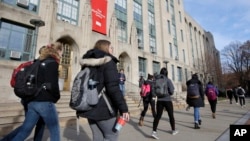
Education and immigration advocates say African students face high denial rates when seeking visas to study in the United States, and they are pushing for changes.
Visa rejection rates are higher than elsewhere in regions of the Middle East, South America and Africa, with Africa experiencing the highest levels of disproportionate refusals, according to a Presidents’ Alliance on Higher Education and Immigration report released in July 2023.
“Whenever we see that sort of data for any country, let alone a region of the world, it gives us pause,” said Fanta Aw, executive director of NAFSA: Association of International Educators.
Aw told VOA that NAFSA and other institutions met a few times with U.S. State Department officials in 2023 to ask questions and push for visa adjudication changes. She said an investigation still is needed to understand what is happening.
They are expected to meet again in the coming months.
“They’re very committed … and do not want to see inconsistencies in different parts. … We had conversations about staff training at the country level and consular affairs level, and we had assurances that these things are being constantly monitored,” she said.
Data collected through public records requests show that in 2022, half of the students from African countries who applied for a student visa were denied.
In 2023, the trend continued. Ethiopian students had a 78% denial rate, followed by Nigeria at 75%, Kenya at 74%, Congo at 69%, Ghana at 63%, Zimbabwe at 47%, and South Africa at 17%.
“What is the root cause here?” Aw said. “There needs to be assurance that [consular officers] on the ground are fully trained in the way they make determinations around this, that there is consistency in that. We need more visa appointment slots, because with the demand, if people are not even able to get a visa appointment, and when they get the rejection is this high, you can imagine the compounding effect of that.”
In European countries, for instance, one in 10 students was denied a visa during the same time frame.
The student visa, or F-1 visa, allows international students to enroll full time in U.S. government-certified institutions, and it is required for all international students.
“For the past few years, we’ve been tracking this,” Washington-based immigration lawyer Leon Fresco told VOA. “And we happened to notice there’s this weird African disparity here. … Is this happening by inertia? Is this happening because [U.S. officials] wanted it to happen? … We just want people to know there’s this disparity. … [And] start the process of fixing it.”
Word goes around
Advocates say a high rate of visa denials discourages students from applying to U.S. institutions.
“Word goes around, ‘Don’t bother, because you’re never going to make it,’” Aw said. “And that is not the message any of us want to see. … International education is one of the most effective bridge-building, because these are future engineers, future business, future scientists, future artists, future politicians.”
Aw said countries like China and India are actively recruiting in parts of the African continent, and the United States is losing talent.
“Don’t get me wrong — if students want to go to China or India, there’s nothing wrong with that or any other place. But it shouldn't be because they couldn't get here,” she said.
Top priority
U.S. officials told VOA that international students are a top priority for the Department of State and that all visa applications are processed on their individual merits according to U.S. immigration law.
A State Department spokesperson told VOA that EducationUSA, a network supported by the U.S. government, is actively promoting U.S. higher education in Africa.
“Demand for student visas has skyrocketed across many regions in recent years. Our missions in Africa, South and Central Asia, and the Western Hemisphere all issued more student and exchange visitor visas in [fiscal year] 2023 than ever before,” a State Department official wrote in an email. “With sharp increases in demand, a commensurate increase in denials is expected.”
Aw recognizes that U.S. officials are working on visa adjudications. She praised the change announced in December by the State Department, which waived in-person interviews for student visa renewals.
Students can now apply for renewal without traveling to their home country, as long as their visa was issued within 48 months and they meet other criteria such as never having been refused a visa.
“We were pleased. … We see progress. … But even with that, it’s at the discretion of the consular affairs [official],” Aw said.
In 2023, more students from Africa got visas to study in the U.S. than ever before, the State Department says.
Compared to 2019 — before the pandemic — there is a 61% increase. Countries like Nigeria, Ghana, Zimbabwe, Uganda, Eswatini, Ivory Coast and Madagascar saw the highest number of student visas issued in the past 20 years.
In a January letter to Secretary of State Antony Blinken, some congressional leaders urged greater attention toward equity in student exchange programs and visa adjudication. They emphasized its pivotal role in fortifying diplomacy and bolstering the U.S. economy.
“Because of these benefits, it is critical that foreign students from Africa are treated similarly to foreign students from other parts of the world. There should be no reason that the State Department data should reflect such disparities among similarly situated countries,” they wrote.
The next report on international student visa issuance and denials is expected in October.




